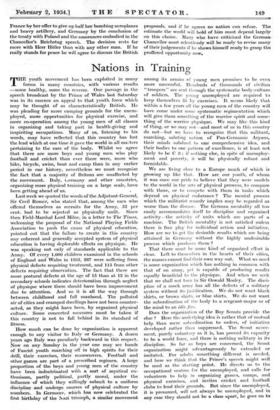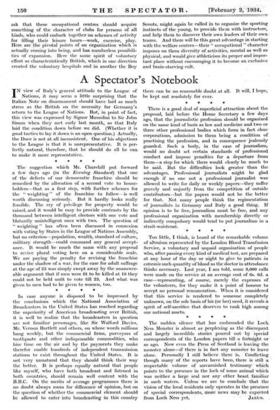Nations in Training T HE youth movement has been exploited in
many forms in many countries, with various results —some healthy, some the reverse. One passage in the speech broadcast by the Prince of Wales last Saturday was in its essence an appeal to that youth force which may be thought of as characteristically British. He was pleading for more camping grounds for the unem- ployed, more opportunities for physical exercise, and more co-operation among the young men of all classes in organizing and taking part in health-giving and inspiriting occupations. Many of us, listening to his words, may have reflected that this country has lost the lead which at one time it gave the world in all matters pertaining to the care of the body. Whilst we agree that there are more boys and young men who play football and cricket than ever there were, more who hike, bicycle, swim, boat and camp than in any earlier period in our history, nevertheless we must recognize the fact that a majority of Britons are unaffected by the movement Italy, Germany and other countries, organizing mass physical training on a large scale, have been getting ahead of us.
Last week we quoted the words of the Adjutant-General, Sir Cecil Romer, who stated that, among the men who offered themselves as recruits for the Army, 52 per cent. had to be rejected as physically unfit. Since then Field-Marshal Lord Milne, in a letter to The Times, welcoming the proposal of the National Playing Fields Association to push the cause of physical education, pointed out that the failure to create in this country any coherent and generally accepted system of physical education is having deplorable effects on physique. He was speaking not only of standards applicable to the Army. Of every 1,000 children examined in the schools of England and Wales in 1932, 267 were suffering from physical defects requiring treatment, and 115 from other defects requiring observation. The fact that there are more postural defects at the age of 15 than at 12 in the secondary schools indicates deterioration through neglect of physique where there should have been improvement due to attention. And so it is all the way through between childhood and full manhood. The polluted air of cities and cramped dwellings have not been counter- acted, as they might have been, by organized physical culture. Some concerted measures must be taken if this country is not to fall behind in its standard of fitness.
How much can be done by organization is apparent enough to any visitor to Italy or Germany. A dozen years ago Italy was peculiarly backward in this respect. Now on any Sunday in the year one may see bands of Fascist youth marching off in high spirits for their drill, their exercises, their manoeuvres. Football and other games are part of a prescribed regimen. A large proportion of the boys and young men of the country have been indoctrinated with a sort of mystical en- thusiasm, partly political, partly moral, under the influence of which they willingly submit to a uniform discipline and undergo courses of physical -culture by numbers. -In _Germany, which has now celebrated the first birthday of the Nazi triumph, a similar movement among its armies of young men promises to be even more successful. Hundreds of thousands of civilian "troopers" are sent through the systematic body-culture of soldiers. The young unemployed are required to keep themselves fit by exercises. It seems likely that within a few years all the young men of the country will have come under some systematic regimentation which will give them something of the warrior spirit and some- thing of the warrior physique. We may like this kind of thing, or we may not—and most of us in this country do not—but we have to recognize that this militant, marching, saluting nation of Pan-Germanic Aryans, their minds subdued to one comprehensive idea, and their bodies to one pattern of excellence, is at least not likely to be C 3; if nothing else, in spite of unemploy- ment and poverty, it will be physically robust and formidable.
We are living close to a Europe much of which is growing up like that. How are our youth, of whom it was once our pride to believe that they were models to the world in the arts of physical prowess, to compare with those, or to compete with them in tasks which depend on physical endurance ? The mental process which the militarist remedy implies may be regarded as worse than the disease. The German mentality all too easily accommodates itself to discipline and organized activity—the activity of units which are parts of a machine. The British mentality is not satisfied unless there is free play for individual action and initiative. How are we to get the desirable results which are being attained in Germany without the highly undesirable process which produces them ?
That there must be some kind of organized effort is clear. Left to themselves in the hearts of their cities, the masses cannot find their own way out. What we need is some organization which has nothing in common with that of an army, yet is capable of producing results equally beneficial to the physique. And when we seek that we shall not turn to Sir Oswald Mosley. The disci- pline of a mock army has all the defects of a military system without its justification. We do not want black shirts, or brown shirts, or blue shirts. We do not want the subordination of the body to a sergeant-major or of the mind to an idee fixe.
Does the organization of the Boy Scouts provide the clue ? Here the underlying idea is rather that of mutual help than mere subordination to orders, of initiative developed rather than suppressed. The Scout move- ment, purely voluntary as it is, has proved its capacity to be a world force, and there is nothing military in its discipline. So far as boys are concerned, the Scout organization might advantageously be extended or imitated. For adults something different is needed, and here we think that the Prince's speech might well be used as the starting point. He directs us to the occupational centres for the unemployed, and calls for volunteers to help in organizing games, camps, and physical exercises, and invites cricket and football clubs to lend their grounds. But since the unemployed, it is presumed, will not always be unemployed, and in any case they should not be a class apart, he goes on to ask that these occupational centres should acquire something of the character of clubs for persons of all kinds, who could embark together on schemes of activity for filling their leisure hours—work, exercise, play. Here are Vie pivotal points of an organization which is actually coming into being, and has numberless possibili- ties of expansion. Here the same spirit of voluntary effort so characteristically British, which in one direction created the voluntary hospitals and in another the Boy Scouts, might again be called in to organize the sporting instincts of the young, to provide them with instructors, and help them to discover their own leaders of their own teams. And there will be this great advantage in starting with the, welfare centres—their" occupational " character imposes on them diversity of activities, mental as well as physical, and would give athleticism its proper and impor- tant place without encouraging it to become an exclusive and brain-starving cult.









































 Previous page
Previous page